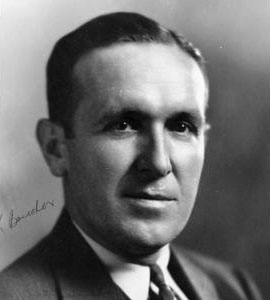
| Name: | Frank (Raffles) Boucher | |
| Year: | 2010 | |
| Category: | Athlete | |
| Sport: | Hockey |
He took a job as an office boy with the federal government for the duration of World War I. Boucher then joined the Royal Canadian Mounted Police and moved west. While in Lethbridge working with the Mounties, Boucher played for the Lethbridge Vets along with Mountie teams he organized. After a year working in Banff, Alberta, Frank returned home to play for the Ottawa Senators for the 1921–22 season. Boucher then played for the Vancouver Maroons until 1926. The Maroons would play in the 1923 Stanley Cup Final against the Senators, losing 3-2. The Maroons played in the 1924 Stanley Cup playoffs against Montreal, losing to the Canadiens in a best-of-three series 2–0.
In 1926, when the western league dissolved, his rights were sold to the Boston Bruins. He never played for the Bruins as Conn Smythe then paid the Bruins $1500 for Boucher, on the advice of Bill Cook, whom he’d played against out west. Boucher became a member of the original New York Rangers team. Boucher played for the Rangers until he retired in 1937–38. Boucher centered a line with the brothers Bill and Bun Cook, and together they helped the Rangers win the Stanley Cup in 1928 and 1933, also reaching the Finals in 1932. The Cook-Boucher line became one of the most celebrated lines the game has ever seen.
Frank was not only a brilliant forward, but was also one of the game’s classiest. Lady Byng, wife of Viscount Byng, the Governor-General of Canada, donated a trophy to be awarded to the NHL’s “most gentlemanly player.” While playing for the New York Rangers, Boucher won the Lady Byng Memorial Trophy 7 times in 8 years. He was then given the trophy outright, and Lady Byng donated another trophy to the NHL.
The Rangers hired him to coach the New York Rovers, a minor-league team that also played at Madison Square Garden, as his apprenticeship to coaching the Rangers. When general manager Lester Patrick made the decision to retire from coaching prior to the 1939–40 season, he hired Boucher, who led his Ranger club to the last Stanley Cup. The franchise would be in existence for 68 seasons before they won a Cup without Boucher being directly involved.
After finishing first in the NHL’s regular season in 1942, the Rangers lost in the playoffs to the Toronto Maple Leafs. Soon they became victims of the military draft of World War II and went into a steep decline. In the 1943–44 NHL season the New York Rangers were losing so badly that Boucher came out of retirement for 15 games to play where he recorded 14 points. The Rangers finished the 50 game season with only 6 wins. From 1940 to 1972 they reached the Stanley Cup Finals only once. When Patrick Retired, Frank took over as general manager. He got the Rangers into the playoffs in 1947–48.
In 1943, Frank rewrote the NHL rule book, this began the modern era of the NHL. At this time he incorporated the red line, which turned pro hockey into an even more offensive game. Frank also popularized the strategy of pulling the goaltender in favour of an extra attacker. During the 1945–46 season, Boucher became the first coach to use two goalies regularly. Alternating every game, and later, every four to six minutes, proving the usefulness of having two goalies.
He was inducted into the Hockey Hall of Fame in 1958. In 1998, he was ranked number 61 on The Hockey News’ list of the 100 Greatest Hockey Players. His uniform number 7 hangs in the rafters of Madison Square Garden, although it was retired for a later Ranger, Rod Gilbert. Although later Rangers such as Gilbert and Mark Messier have been more honored by recent fans, Boucher’s status as the star of two Ranger Stanley Cups and the coach behind another marks him, except perhaps for team builder Lester Patrick, as the greatest Ranger of them all.
In 1974, Boucher wrote When the Rangers Were Young, a book about his experiences with the old-time Broadway Blueshirts, giving him one last moment of fame during his lifetime.
In 2009, Boucher was ranked No. 9 on the all-time list of New York Rangers in the book 100 Ranger Greats (John Wiley & Sons).
